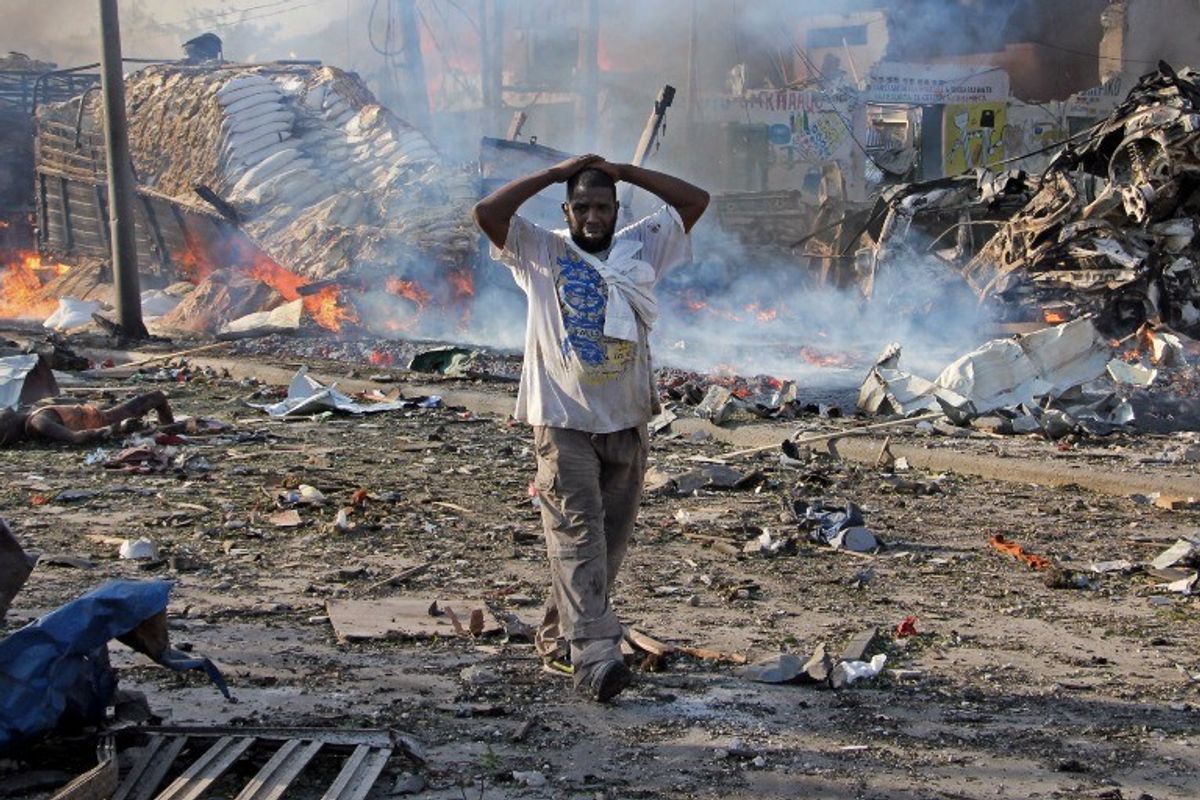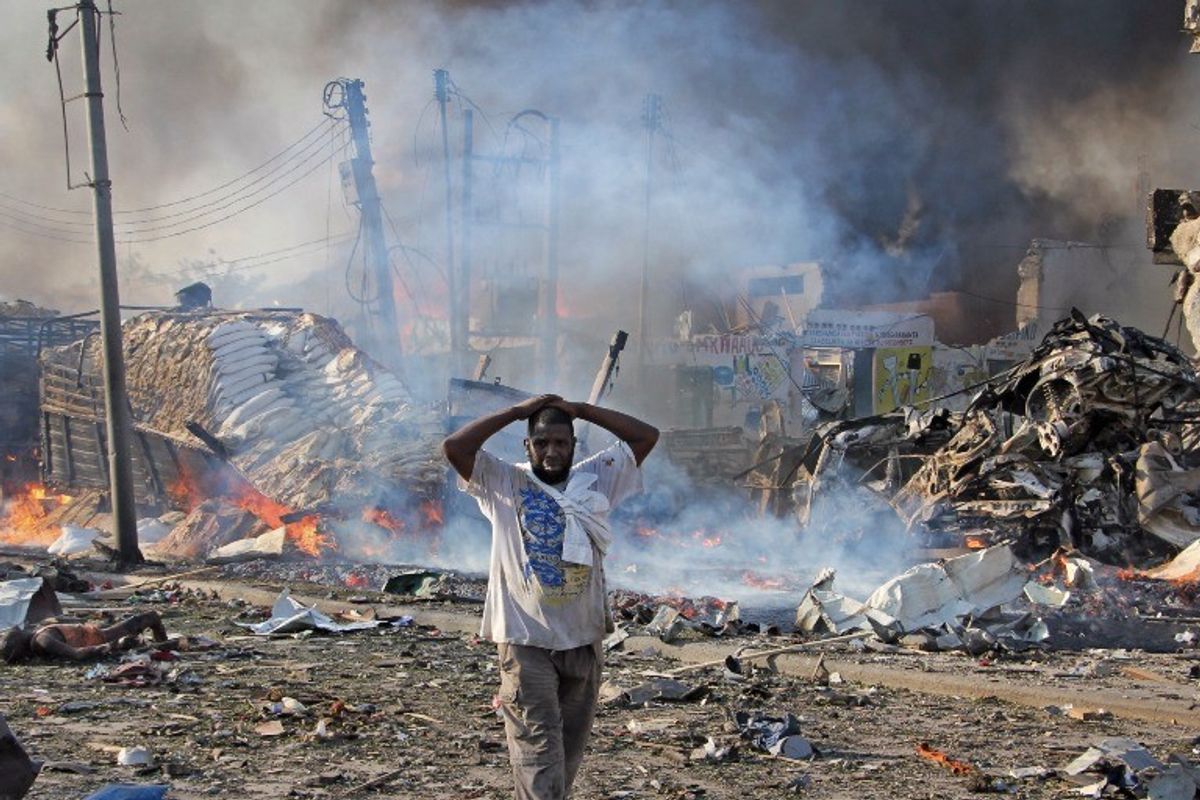On Saturday, a truck bomb struck the Somali capital of Mogadishu killing more than 320 people and injuring more than 500 others. While no group officially claimed responsibility for the brutal attack, Somali officials and counterterrorism experts have pinned the responsibility on al Shabaab, an al Qaeda linked organization that has carried out several attacks inside Somalia as well as in neighboring Kenya, Uganda, and Djibouti. Since its creation in 2008, al Shabaab has posed a significant threat to the Horn of Africa region. The group pledged allegiance to al Qaeda in 2012 and remains al Qaeda’s affiliate in East Africa. The Cipher Brief spoke with Seth Jones, Director of the International Security and Defense Policy Center at the RAND Corporation, to discuss the current threat posed by al Shabaab as well as how the U.S. should respond to the most horrific terrorist attack in Somali history.
The Cipher Brief: How likely is it that the attack in Mogadishu over the weekend was al Shabaab affiliated?
Seth Jones: It certainly fits the description of al Shabaab’s broader campaign and the type of attacks that the group has conducted in the past, not just in Mogadishu, but throughout the region in places such as Uganda and Kenya. They are involved in a long, drawn out insurgency, and as part of that insurgency, have conducted ambushes, raids, targeted assassinations, and major truck and other bombings.
TCB: Is there any possibility it could be linked to another group? For example, the ISIS faction that broke off from al Shabaab that’s now operating in and around Puntland?
Jones: ISIS does have cell structures in Somalia. For the last two years, they have made a pretty serious effort to peel off individuals from Al Shabaab, but generally, it has not been successful.
More recently, as part of the group’s broader guidance from one of their senior committees, ISIS is no longer encouraging people to come to Iraq and Syria, but instead advocates for pushing foreign fighters to other areas of strategic importance such as Yemen, Afghanistan, Libya, and Somalia.
ISIS has an interest in the region, but it is just not big and has pretty small in numbers in Somalia. But obviously ISIS has the capabilities to conduct a number of attacks, and this would be a pretty serious break though since ISIS has not done much in Somalia.
TCB: Can you explain al Qaeda involvement? My understanding is that al Shabaab, or at least certain factions, have affiliated themselves with al Qaeda. But are there still al Qaeda operatives who operate independently of al Shabaab in Somalia?
Jones: Al Shabaab has an organizational structure and its emir and its previous emirs have pledged their loyalty to al Qaeda leader Ayman al Zawahiri. So the organization is tied to al Qaeda at the senior level since they’ve pledged bayah, or loyalty.
In practice, however, like any organization, al Shabaab has people who have closer relations with al Qaeda and who have more of an interest in the broader, global caliphate that al Qaeda still aims to establish, but for many others that, their participation is really due to local Somali issues. So obviously there’s a lot of variation within al Shabaab about how important an al Qaeda relationship is.
In terms of the actual relationship and communication, the most significant ties have been with al Qaeda in the Arabian Peninsula and Yemen, especially with organizations in al Shabaab like Amniyat, which is their external operations segment.
TCB: How can the U.S. respond to an attack like this?
Jones: Obviously, this would not be the first attack that al Shabaab has perpetrated in Mogadishu, and it’s not the first attack that al Shabaab has perpetrated killing large numbers of civilians. They've done it at the Westgate Mall in Kenya and they’ve done it at Garissa University. Those killed were foreigners at a high end shopping mall in the first incident and university students in the second.
Part of the focus must be on continuing to wage a political and military campaign against al Shabaab to make sure that there are the resources in place to weaken them on multiple fronts. There are also more immediate steps that can be taken. If one wants to get into holding the people involved in the attack responsible, you can start to identify who was involved in masterminding the plot within al Shabaab, who was involved in helping pull together the resources to get it in place, and then target them. But that’s not a long-term solution for fixing the problem, that’s more of a shorter term revenge response.
TCB: Is that the kind of intelligence analysis assistance the U.S. typically would give the Somali National Army?
Jones: Yes. There are lots of actors involved in combatting al Shabaab, including the Somali National Army. The U.S. has also orchestrated strikes itself against the group. It has the capability to strike with drones against targets in Somalia, and it’s done that.
There are also other African forces countries in Somalia, including the Kenyans, the Ethiopians, Ugandans that, at least in the areas where their militaries operate, that have conducted some attacks against al Shabaab. So lots of countries could respond along those lines.
But in terms of the U.S., the U.S. certainly has the capability to provide that kind of information to the Somali Army, conduct strikes itself, or conduct tandem operation with other forces.
TCB: Do you think the current U.S. strategy is sufficient? The focus on airstrikes, some training of the local forces, and also intelligence assistance?
Jones: The problem for the U.S. is that it’s being stretched pretty thin on the counterterrorism and counterinsurgency front. Obviously it has interests in Iraq, Syria, Afghanistan, Libya, and Yemen. Four members of the U.S. forces recently died in Nigeria. Somalia is another battleground.
I actually think that the military resources in Somalia are probably sufficient. al Shabaab, at this point, is not plotting attacks against the United States’ homeland, at least not meaningfully. The number of Americans that at one point went to Somalia to fight with al Shabaab has come way down from previous years.
The problem from a U.S. standpoint is that the primary element of U.S. strategy in Somalia is military. There is no U.S. embassy in Somalia. The diplomatic and the development components are pretty small and largely ineffective. There’s a strong argument for increasing those focuses on Somalia, which can address deeper rooted problems in the country.










